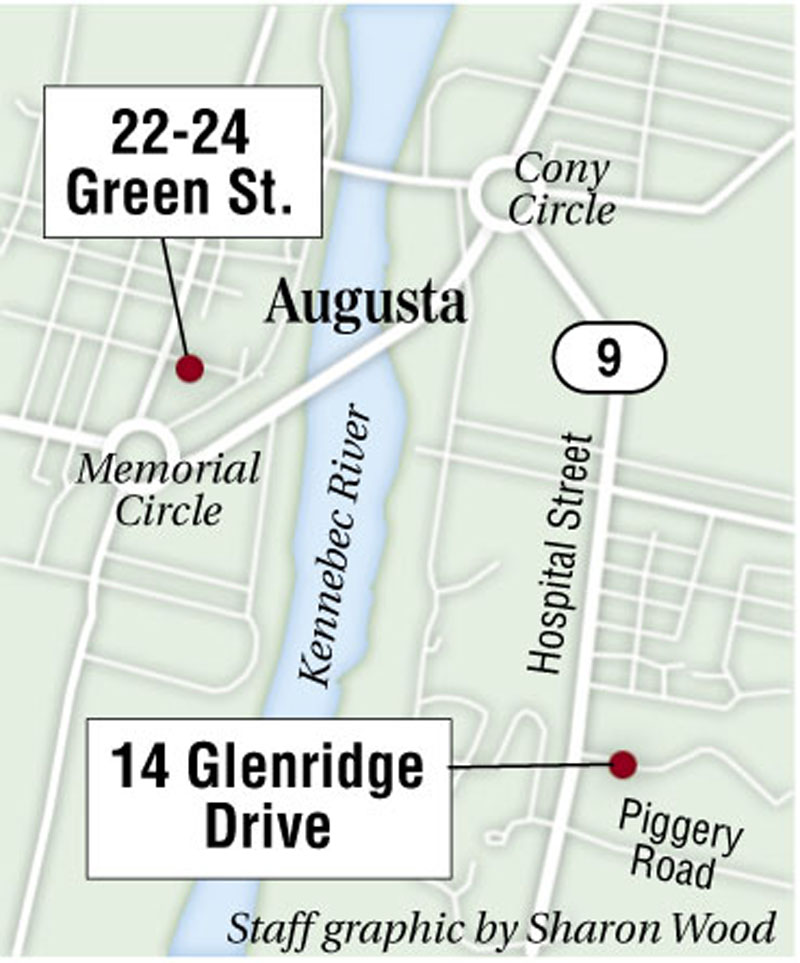AUGUSTA — Enoch Petrucelly had nowhere to live except inside the locked doors of the state’s only forensic hospital.
Conditions set by a judge limited the Palmyra man to living on the campus of the former Augusta Mental Health Institute after he’d been committed to state custody. Petrucelly was found not criminally responsible for stabbing his brother to death on North Haven Island in August 2008.
But the three group homes on the former institute grounds are closing or scheduled to close, and the 16 residents are being moved to other locations around Augusta, including at 22-24 Green St. and 14 Glenridge Drive.
The moves — resulting from a decision by the Office of Adult Mental Health to stop funding those group homes — put forensic patients even more into the community. The patients affected have been granted modified release status by a judge, allowing them to live outside the hospital under certain restrictions.
Without a judge’s authorization, Petrucelly, 27, would have to remain in the locked forensic section of Riverview Psychiatric Center in Augusta.
So Petrucelly’s attorney, Harold Hainke, recently petitioned in Kennebec County Superior Court for his client to be allowed to live at a new eight-bed residential center being readied at 14 Glenridge Drive.
Hainke argued that the center is substantially similar to the group home on the former institute grounds, so Petrucelly should be permitted to live there.
Assistant Attorney General Laura Yustak Smith raised concerns in court about the proximity of MaineGeneral Rehabilitation & Nursing Care at Glenridge, which also operates an on-site day care center for children.
But she agreed reluctantly with the move.
“I don’t know that he has another place to go,” she said, “The state doesn’t want him moved anywhere else.”
Justice Donald Marden granted the request after a hearing July 27. Depending on when he’s deemed ready to move, Petrucelly could be among the first patients at the new residential location.
Close observation
The Glenridge Drive building, once home to physicians’ practices, most recently housed administrative offices of Motivational Services Inc. The nonprofit agency provides housing and other services to between 26 and 28 forensic patients requiring 24-hour supervision seven days a week.
Petrucelly is one of those patients requiring such supervision. A forensic patient is someone who has been found by a judge to be not criminally responsible for a crime — such as murder, arson or assault.
The Glenridge Drive site is surrounded by physicians and other health provider offices, as well as a pharmacy.
At Petrucelly’s recent court hearing, Richard M. Weiss, executive director of Motivational Services, testified that residents of the the Glenridge Drive home will not be locked in, nor will the windows be alarmed.
He said residents must sign out and indicate a return time. If they don’t return within 15 minutes of that time, other staff and Augusta police are notified.
Dr. William Nelson, medical director at Riverview, testified that it is important for adequate security to be in place.
As with Petrucelly, “99 percent of the time clients first leaving the hospital were placed on campus in group homes,” Nelson said. “I think the hospital feels for the very first release step for the vast majority of our clients, proximity was important — proximity to tests, lab services and proximity to the (Assertive Community Treatment) team, which could be there in two minutes if we had to.”
Mary Louise McEwen, superintendent of Riverview Psychiatric Center, said the Riverview Assertive Community Treatment team does individual therapy, group therapy, medication and medication management and other services to ward against risk patients may present.
“It’s a very intense process of close observation,” she said. “If we get the slightest inkling someone is starting to decompensate, we bring them straight back to the hospital. I think we have a very tight system right now.
“Regardless of where they’re living, we have close supervision of them. I feel very confident about that.”
Marden, the Superior Court justice, said that the fact that forensic patients remained on the Riverview campus, rather than elsewhere in the community, was seen as providing a degree of safety for the community.
McEwen said forensic patients are placed in the community with permission and after a “slow, gradual process of many years of supervision and watching.”
“We’re always concerned about safety,” McEwen said recently. “We consider that to be our No. 1 job, to protect the public.”
Group homes closed
McEwen said the group homes on the former Augusta Mental Health Institute campus are being closed for several reasons.
“The biggest one was because clients that were living there were not able to get any benefits, such as Social Security disability, because (the federal government) considered it an extension of the hospital,” she said. “It’s still considered the old AMHI grounds, and in Social Security’s mind they weren’t living in a facility that was separate from the hospital.”
She said affected patients regained eligibility by moving off grounds. Most patients qualify for Social Security benefits because of their “serious and persistent mental illness.”
The benefit problem has cropped up during the past few years.
“I don’t know if the guidelines were adjusted or there was a change in the interpretation of who was eligible and who wasn’t,” she said. “It was costing the state more money to have them maintained on the grounds. We were having to pay for all their needs; they weren’t able to draw down any benefits.”
Petrucelly remained at the hospital even though he had court permission to move to a group home on the grounds.
“He had permission to leave but we were waiting to move him,” she said. Once a judge grants permission for the off-site move, “then it’s up for us to do the transition to the home if it’s clinically indicated. Sometimes it can take a couple of months for them to move.”
Riverview has 44 forensic beds plus and additional 12 forensic clients on the civil side. McEwen said some of those people are there for evaluation and treatment to be returned to mental competency so they can stand trial.
Once the group homes on state grounds are vacated, the buildings will be evaluated and included in a plan that will cover the entire east campus, said Jennifer Smith, communications coordinator for the state department that includes the Bureau of General Services.
Weiss, of Motivational Services Inc., said his agency purchased the 14 Glenridge Drive property eight years ago.
“This facility is actually slightly closer as the crow flies to the hospital,” Weiss testified during Petrucelly’s recent hearing. He also said staffing levels would be higher at the Glenridge and Green Street locations than when it was spread across three locations.
Motivational Services Inc., operates 12 group homes or congregate living settings in the area and has a dozen other staffers “who, if needed, could provide additional coverage,” Weiss said.
He also said security cameras are outside the building and inside in the common areas.
“Historically, when individuals required more supervision because they were not trustworthy or tried to leave, we put alarms on windows and doors,” Weiss said.
In response to questions in court, Weiss also testified, “The building lends itself to individuals stepping down from a locked setting. It’s as close as any building we could find.”
He said there were no residential homes nearby.
Moving time
Weiss said Tuesday that the eight-bed patient center at Glenridge will open by the end of August. The group home on Independence Drive closed in July. The two homes on Arsenal Street remain open for now.
As people come out, sometimes they go directly to group homes on the campus and sometimes other locations in the Augusta area.
Weiss said Petrucelly could be the first one to occupy Glenridge Drive, but that depends on when the hospital says he’s ready to be moved. He, too, said he was aware of the patients’ difficulties receiving Social Security benefits, including supplemental security income or disability income.
“For a couple of years, Social Security has been telling our clients living on grounds they are not eligible because they’re living on a state-owned facilities and the state is responsible for paying for their subsistence,” he said. “As soon as they move off grounds, they become eligible for supplemental benefits. For those individuals, they’re basically destitute.”
The benefits can be used for pay for food, rent, clothing, and personal items.
Weiss said the hope is that the residents have at least 20 hours a week of planned activities, which can include employment, and the agency supervises patients only as long as they require services round the clock.
Petrucelly, for instance, is permitted to work up to eight hours a day for up to 24 hours per week. He is also allowed to visit his family’s Palmyra home.
His activities, however, cannot interfere with his treatment, a court order says.
Copy the Story LinkSend questions/comments to the editors.





Success. Please wait for the page to reload. If the page does not reload within 5 seconds, please refresh the page.
Enter your email and password to access comments.
Hi, to comment on stories you must . This profile is in addition to your subscription and website login.
Already have a commenting profile? .
Invalid username/password.
Please check your email to confirm and complete your registration.
Only subscribers are eligible to post comments. Please subscribe or login first for digital access. Here’s why.
Use the form below to reset your password. When you've submitted your account email, we will send an email with a reset code.